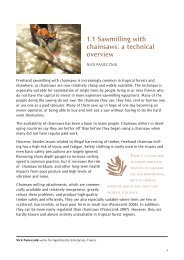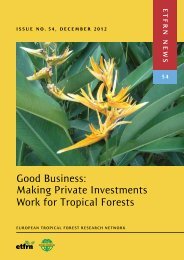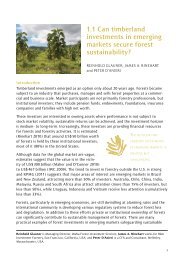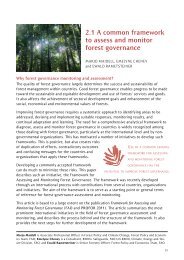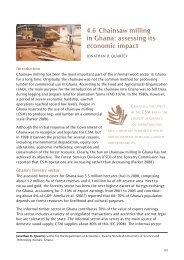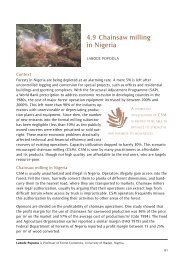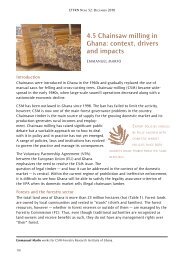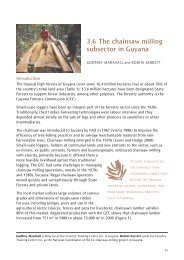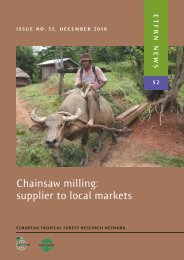Chainsaw milling: supplier to local markets - European Tropical ...
Chainsaw milling: supplier to local markets - European Tropical ...
Chainsaw milling: supplier to local markets - European Tropical ...
Create successful ePaper yourself
Turn your PDF publications into a flip-book with our unique Google optimized e-Paper software.
ETFRN NEws 52: DEcEmbER 2010<br />
that the illegal timber trade can be eliminated. pressure from outside — e.g., through<br />
international agreements such as Vpas or rEDD+ — is needed <strong>to</strong> support efforts <strong>to</strong><br />
regulate the <strong>local</strong> timber trade. pressure can include providing incentives for governance<br />
reforms and reducing illegal timber trade.<br />
The three existing Vpas, in Cameroon, Ghana and the republic of Congo, include timber<br />
production for the domestic market. although it is good that these trade agreements<br />
address the whole timber sec<strong>to</strong>r, it also poses a challenge; studies have shown that<br />
illegal chainsawn timber supplies the majority of the domestic market in these countries<br />
(appendix 1).<br />
a strict application of Vpa measures, without providing equivalent alternatives for<br />
<strong>local</strong> lumber consumption and livelihoods, could lead <strong>to</strong> the end of informal but wellestablished<br />
Csm. bridging the numerous conflicting <strong>local</strong> and global interests that<br />
characterise Csm requires a meaningful and inclusive dialogue among all stakeholders.<br />
The voices of weaker and illegal ac<strong>to</strong>rs easily go unheard when decisions are made, in<br />
spite of the influence they exert over what happens in the forest.<br />
a multi-stakeholder dialogue will not solve all the problems associated with illegal logging<br />
and the domestic market, but it is critical for negotiating agreements over the difficult<br />
trade-offs between livelihoods and forest management and for introducing additional<br />
measures on capacity building and <strong>local</strong> governance — besides strict enforcement — <strong>to</strong><br />
solve underlying problems of illegality and inefficiency. ignorance of these fac<strong>to</strong>rs only<br />
forces Csm further in<strong>to</strong> illegality.<br />
This is also true for rEDD measures. if applied efficiently Csm could qualify as a low<br />
carbon activity, but if not, it could lead <strong>to</strong> forest degradation and have serious socioeconomic<br />
impacts that would jeopardize attempts <strong>to</strong> establish a sustainable timber<br />
industry. all stakeholders need <strong>to</strong> be ready <strong>to</strong> openly and transparently debate the costs<br />
and benefits of a transition <strong>to</strong> low carbon development, and <strong>to</strong> jointly agree on scenarios<br />
<strong>to</strong> make the best use of the opportunities available.<br />
The articles in this ETFRN News show that addressing Csm adequately is a challenge due<br />
<strong>to</strong> the multiplicity of overlapping interests and the wide range of ac<strong>to</strong>rs involved. when<br />
these characteristics are effectively addressed, however, Csm can generate substantial<br />
socio-economic benefits <strong>to</strong> <strong>local</strong> people, while sustaining forests resources.<br />
Endnotes<br />
1. REDD+ = Reducing Emissions from Deforestation and forest Degradation in developing countries;<br />
and the role of conservation, sustainable management of forests and enhancement of forest carbon<br />
s<strong>to</strong>cks in developing countries.<br />
2. Information from the articles in this ETFRN News is referenced through the name of the author and<br />
article number or the country name and article number.<br />
3. In most countries more advanced technologies, such as portable sawmills, are also used <strong>to</strong> convert<br />
timber for the domestic market. This issue does not consider mobile <strong>milling</strong>, except in a few<br />
specific cases.<br />
xxii



